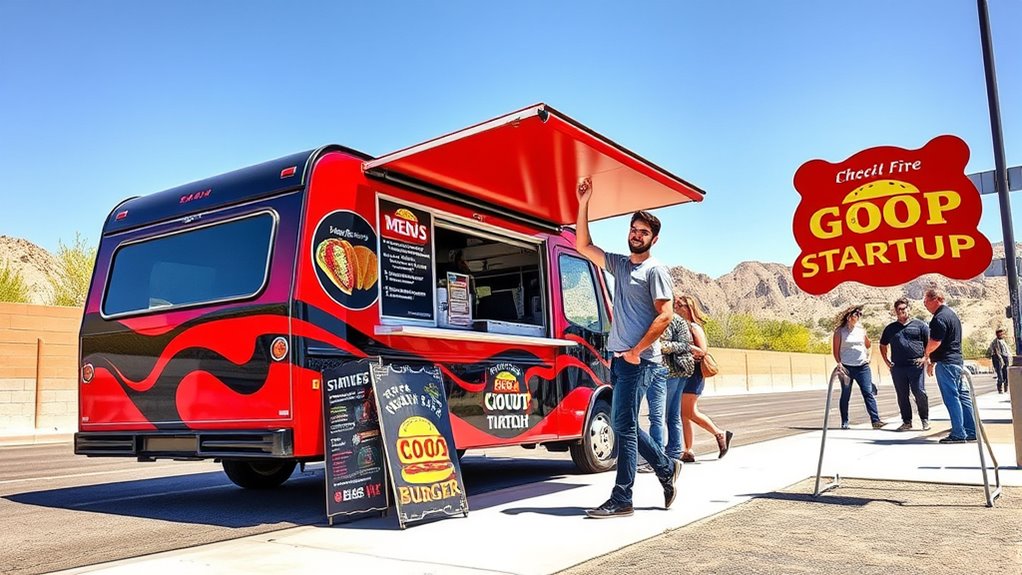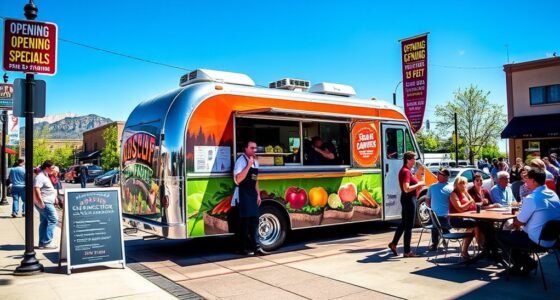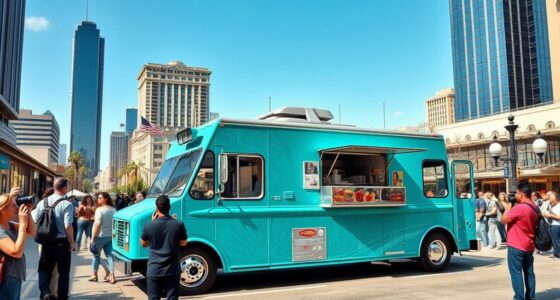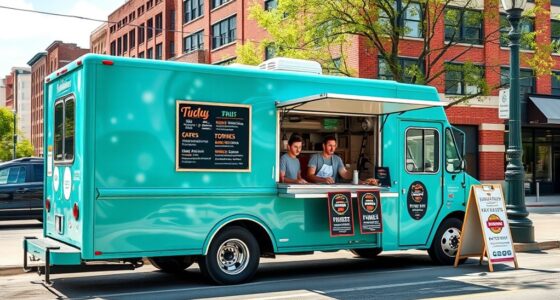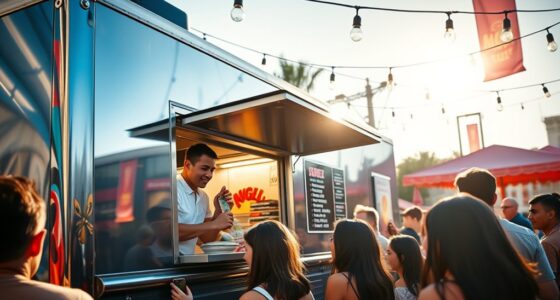To start a food truck in Henderson, Nevada, you’ll need permits including a mobile food vending license, health permit, and business license, with costs around $1,864 to $3,000. Choose prime locations like downtown or events, and plan your menu to meet safety standards while highlighting local flavors. Effective marketing through social media and community events helps attract customers. Keep safety and compliance top priority—continue exploring for detailed steps to launch successfully.
Key Takeaways
- Obtain necessary permits including Mobile Food Vending License, health permit, and City of Henderson Business License, ensuring compliance with local regulations.
- Budget for truck costs ($15,000–$150,000), permits (~$1,864–$3,000), inventory, permits, insurance, and ongoing expenses like fuel.
- Secure high-foot-traffic locations such as Downtown Henderson, parks, and community events, focusing on peak hours and local partnerships.
- Develop a compliant menu featuring regional flavors, seasonal offerings, and sustainable ingredients while adhering to health and safety standards.
- Utilize social media, local events, and influencer collaborations to market your food truck and engage with the Henderson community.
Navigating Permit and License Requirements in Henderson
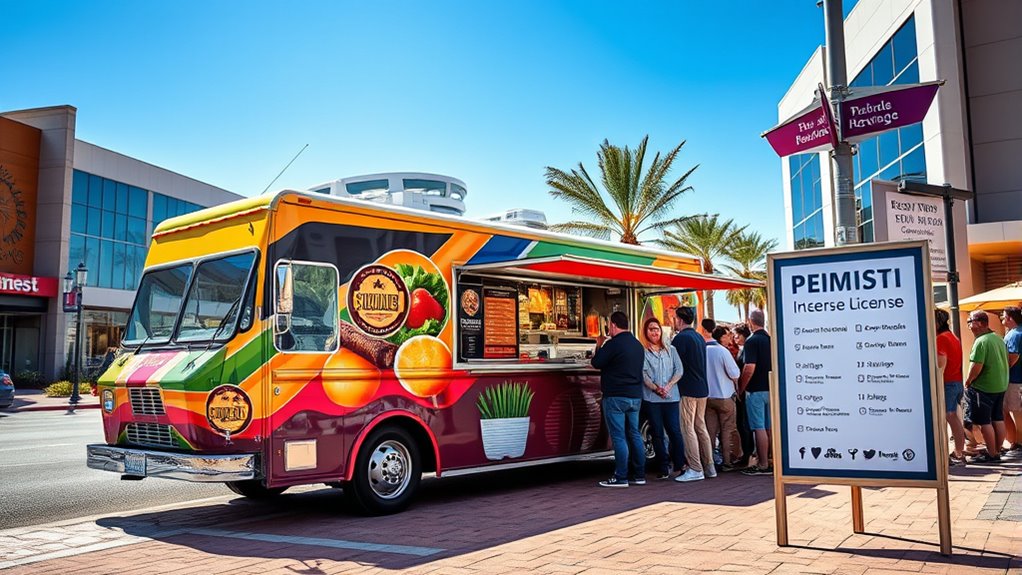
To legally operate a food truck in Henderson, you need to navigate several permit and license requirements. First, obtain a Mobile Food Vending License from the city by submitting detailed business and vehicle information, including make, model, and plate number. You must also comply with Henderson’s Code of Ordinances Section 17-66, which governs mobile food vending rules. Always display your license when asked by customers or authorities. Additionally, secure a health permit from the Southern Nevada Health District before starting operations; this ensures your food handling practices meet safety standards. All food trucks require a City of Henderson Business License, which involves background checks and verification. Finally, your truck may need to be classified as a food establishment and pass annual health inspections to stay compliant. Obtaining the necessary permits and licenses is essential to avoid fines or legal issues. Understanding cheating behaviors and maintaining integrity in your operations can help build trust with your customers and community.
Estimating Costs and Budgeting for Your Food Truck Venture
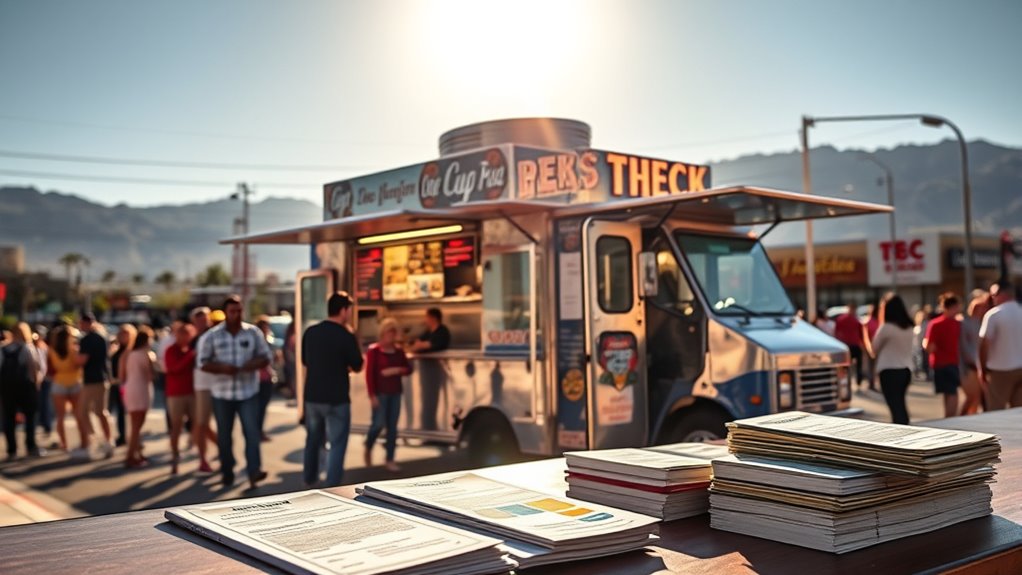
To start your food truck venture in Henderson, you need to understand both the initial investment required and the ongoing expenses you’ll face. From purchasing or leasing your truck to covering monthly costs like fuel, supplies, and permits, budgeting is essential. Carefully estimating these costs helps guarantee your business remains financially sustainable from the beginning. Understanding local permit costs is also crucial, as they can significantly impact your overall budget and timeline for launching.
Initial Investment Requirements
Estimating your initial investment for a food truck venture involves understanding the costs of purchasing or leasing your vehicle, securing necessary permits, and stocking inventory. New trucks typically run between $40,000 and $150,000, depending on size and equipment, while used trucks can cost as little as $15,000 to $50,000. Leasing may lower upfront costs but could increase long-term expenses. Permits and licenses in Henderson, including business, health, and fire department inspections, can total around $1,864 to over $3,000. You should also budget approximately $2,000 to $3,000 for initial food inventory and about $300 for serveware. Additional costs include insurance, marketing materials, and basic maintenance, all of which contribute to your startup’s initial financial foundation. Understanding projector technology can also be beneficial if you plan to incorporate visual displays or digital menu boards into your food truck setup.
Operational and Ongoing Expenses
Understanding your ongoing expenses is essential for maintaining a profitable food truck business in Henderson. Fuel and maintenance costs are significant, with fuel averaging $500–$1,000 monthly and routine maintenance costing hundreds. Unexpected repairs can add up, so setting aside a contingency fund is wise. Seasonal weather impacts, like HVAC checks, also add to costs. You’ll need to budget for:
- Fuel and maintenance, including repairs and seasonal checks
- Licensing, permits, and inspection fees that renew annually
- Insurance covering vehicle, liability, and worker’s compensation
- Skincare product expenses for promotional events or staff uniforms, if applicable
Additionally, expenses for consumables—such as food restocking ($2,000–$3,000 monthly) and disposable serveware—must be managed carefully. Marketing, location rentals, and digital presence fees also contribute to your ongoing expenses, so plan accordingly to stay profitable.
Securing Prime Locations and Operating Times in Henderson
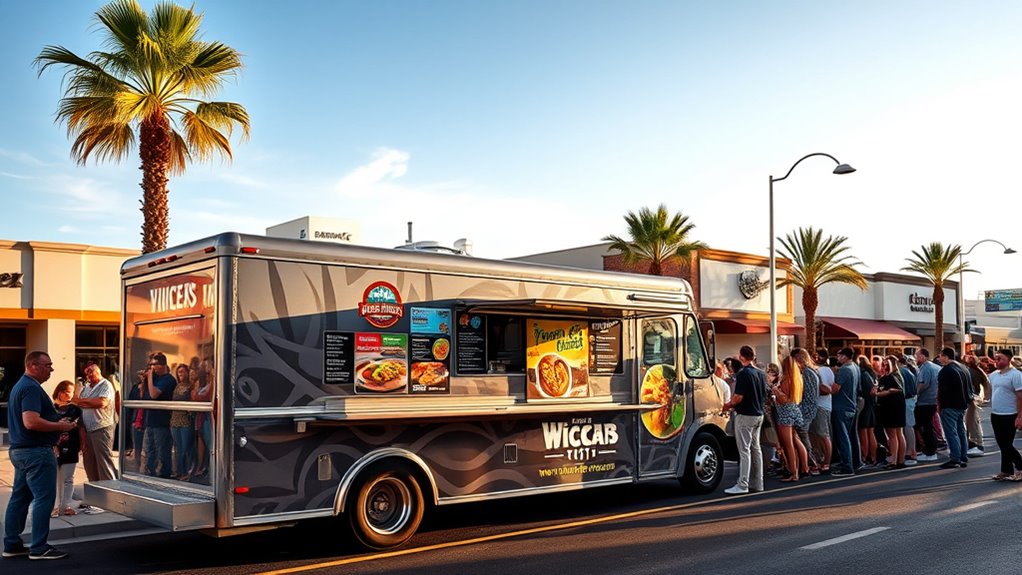
Securing prime locations and ideal operating times in Henderson requires strategic planning and local knowledge. Focus on high-foot-traffic areas like Downtown Henderson, where office workers and entertainment venues draw crowds during lunch and evenings. Participating in festivals, community events, and farmers markets can boost visibility with large audiences. Commercial zones and busy parks attract weekend and peak-hour customers, while industrial zones serve lunchtime shift workers. For operating hours, target lunch from 11:00 AM to 2:00 PM and evenings from 5:00 PM to 9:00 PM, especially Thursday through Saturday. Weekends are prime for parks and events, generally from 11:00 AM to 7:00 PM. Adjust hours seasonally to maximize tourism and community celebrations, and always adhere to local zoning and permit regulations. Incorporating wall organization systems can also help maintain an appealing and organized setup at your food truck location.
Developing a Compliant and Appealing Menu
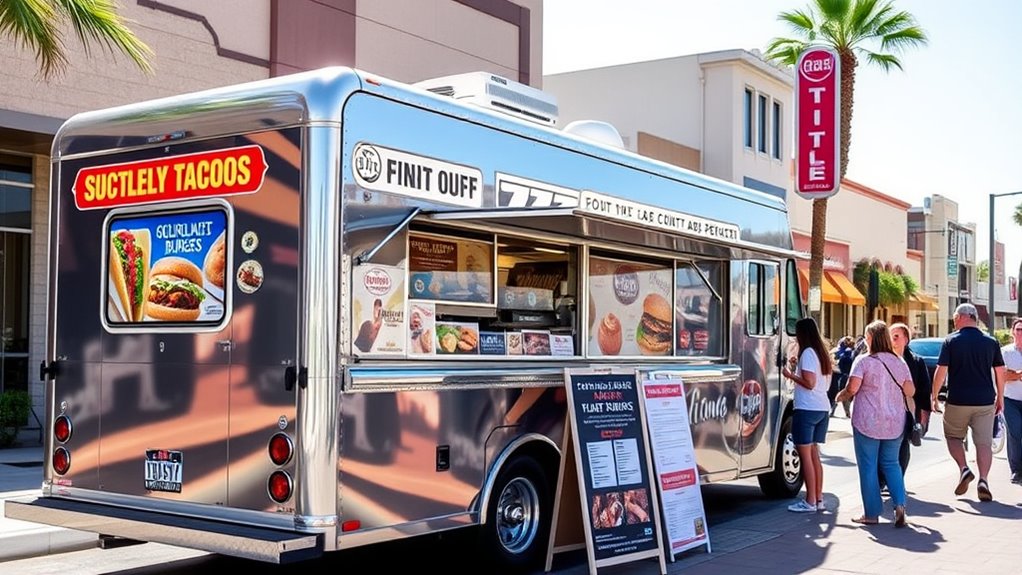
Creating a menu that meets Henderson’s food safety regulations is essential, so you’ll need to follow strict guidelines on temperature control, cross-contamination prevention, and proper labeling. Incorporating local flavors and popular regional dishes helps attract customers and makes your truck stand out. By balancing compliance with local preferences, you can develop a menu that’s both safe and appealing to Henderson’s diverse crowd. Additionally, it is important to regularly review and update your menu to ensure ongoing compliance with any new health regulations. Implementing vertical storage solutions can also help organize ingredients and supplies efficiently, supporting food safety standards and operational flow.
Menu Compliance Standards
How can you develop a menu that’s both compliant with state regulations and appealing to customers? First, ensure your menu aligns with Nevada Revised Statutes Chapter 446, avoiding prohibited items like certain hazardous foods. Your menu must facilitate proper temperature control, supporting safe storage and preparation. Remember, any changes may need re-approval from health authorities. To stay compliant and attractive, focus on:
- Choosing menu items compatible with your mobile setup and approved servicing areas
- Incorporating allergen labels and accurate ingredient info per health standards
- Planning for limited complex dishes that suit mobile prep and storage constraints
- Incorporate food safety standards to ensure your menu maintains health compliance and customer trust
Local Flavor Integration
Ever wondered how to make your food truck stand out while staying within Nevada’s regulations? Incorporating local flavor is key. Use regional ingredients like mesquite, prickly pear, and herbs to boost authenticity. Explore Native American and Southwestern flavors, such as chiles, corn, and traditional spice blends, to resonate with local tastes. Adapt classic Nevada dishes like Basque lamb, cattle ranch BBQ, or shrimp cocktail into your menu. Include seasonal items reflecting local harvests to keep offerings fresh and appealing. Highlight fusion cuisine that combines regional ingredients with popular street food formats to attract diverse customers. Partner with nearby farms and markets to source fresh, sustainable ingredients. This approach not only supports local agriculture but also creates a unique, compliant menu that celebrates Henderson’s culinary heritage. Incorporating traditional dishes like Brazilian Dishes can also add an exotic flair that appeals to adventurous eaters.
Effective Marketing Strategies for Food Truck Success
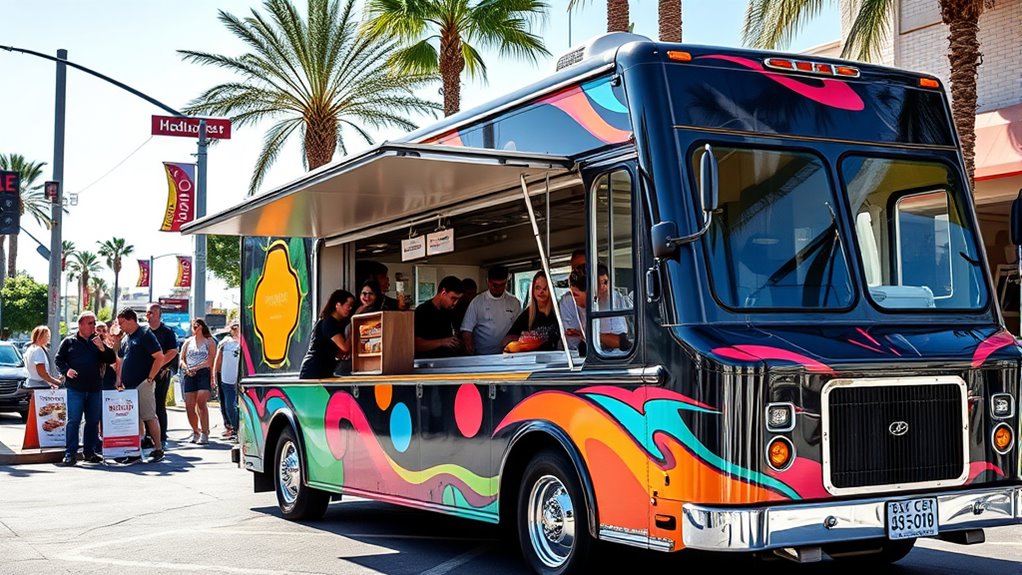
To succeed in the competitive food truck industry, implementing effective marketing strategies is vital. Social media is a powerful tool—68% of food truck owners use it regularly, with Facebook leading at 75%. These campaigns can boost sales by around 20% and encourage customers to spend about 15% more. To maximize your reach, consider:
- Creating engaging social media content and promotions
- Participating in local festivals and community events
- Developing loyalty programs and email marketing campaigns
- Incorporating targeted advertising to reach specific customer segments more effectively
These efforts help build brand awareness, foster customer loyalty, and attract new visitors. Using data analytics and mobile apps also plays a pivotal role by improving targeting and making it easier for customers to find your truck. Loyalty programs and digital tools have been shown to increase repeat sales by up to 30%, combining these strategies ensures sustained growth and visibility in Henderson’s vibrant street food scene.
Ensuring Operational Compliance and Safety Standards
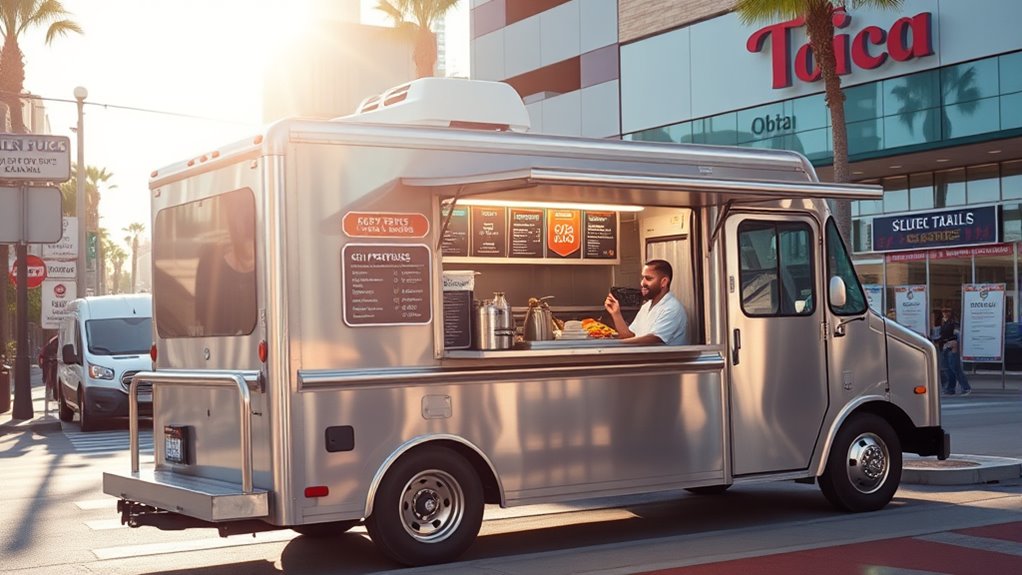
Ensuring operational compliance and safety standards is essential for running a successful food truck in Henderson. You must obtain a Mobile Food Vending License and valid health permits from the Southern Nevada Health District before starting. Zoning and business license approvals from the city or county are also required. Food must be prepared and stored in licensed, inspected facilities—not private homes. You’ll need to comply with strict temperature controls, provide trash and recycling containers, and use approved servicing areas. Operations must prioritize safety by avoiding parking near driveways or entrances without permission, maintaining proper lighting, and following local safety guidelines. Keep all permits, certifications, and inspection records accessible, and ensure timely waste removal to meet environmental standards and pass inspections smoothly. The Health District considers sidewalk vendors as food establishments requiring a health permit, emphasizing the importance of proper licensing and compliance in your operations. Additionally, understanding food safety procedures is crucial to prevent contamination and ensure customer health.
Building Community Connections and Growing Your Customer Base
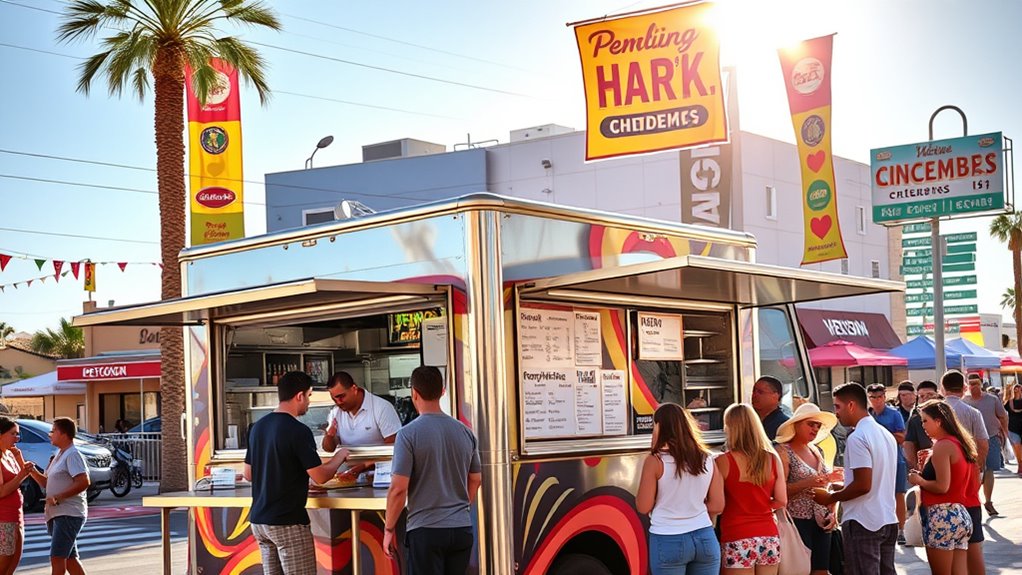
Building strong community connections is essential for growing your food truck’s customer base. Partner with local food bloggers and micro-influencers to create authentic buzz and reach new audiences. Invite them to tasting events and offer exclusive follower discounts to boost engagement. Collaborate with nearby businesses for menu promotions or lunch specials that resonate with the community. Drop off menus or provide catering to offices nearby to tap into local workplace demand. Keep track of influencer code redemptions and partnership outcomes to measure your marketing ROI. Utilize targeted local SEO and geotargeted advertising campaigns to further amplify your reach within Henderson and surrounding areas. Work with local influencers for authentic promotion. Offer seasonal and community-focused menu items. Incorporate a variety of honey gift sets as promotional giveaways or event prizes to attract attention and demonstrate your commitment to local flavors. Use technology and social media to stay connected and promote deals.
Frequently Asked Questions
How Long Does the Henderson Food Truck Permitting Process Typically Take?
You’re probably wondering how long the Henderson food truck permitting process takes. Typically, it starts with initial contact within three business days, followed by submitting complete applications for health and city permits. You can often get a conditional license within 60 days, allowing you to operate while final approvals are pending. Overall, expect the process to take around a few weeks to a couple of months, depending on how quickly you complete each step.
Are There Restrictions on the Types of Food I Can Sell in Henderson?
Like a knight in shining armor, you need to know Henderson’s rules before charging ahead. There aren’t strict restrictions on specific food types, but all items must meet health and safety standards. You can sell anything from sandwiches to desserts, as long as you follow permits and hygiene laws set by the Southern Nevada Health District. Avoid hazardous foods needing special permits, and make certain your menu complies with location and safety regulations.
Can I Operate My Food Truck Outside Designated Locations or Times?
You can’t operate your food truck outside the designated locations or times set by Henderson regulations. You must follow specific rules, including obtaining necessary permits for your chosen spots and hours. Operating without approval risks fines, license suspension, or shutdown. Always verify your location and schedule complies with city and health department rules, and confirm you have the proper permits before starting your daily operations.
What Are the Common Reasons for Permit or Health Inspection Rejections?
This question is more important than the secret to the universe! Common permit or health inspection rejections happen when you submit inconsistent or false info, don’t notify changes, or lack proper signatures and documentation. Operating without valid permits, using unapproved food sources, or failing to meet hygiene standards can also cause rejection. Make certain all paperwork is accurate, timely, and compliant to avoid delays or losing your license altogether.
How Do I Find Upcoming Local Events for Food Truck Vending Opportunities?
You can find upcoming local events for food truck vending by checking online event platforms like Eventbrite and Roaming Hunger, which list Henderson-specific food truck events. Follow Henderson’s city-sponsored schedules such as “Trucks & Tunes” at Water Street Plaza. Use social media groups on Facebook and Instagram to stay updated on community gatherings, festivals, and private events. Also, contact local venues, breweries, and farmers markets directly for upcoming opportunities.
Conclusion
Starting your food truck in Henderson blends the busy energy of city streets with the personal touch of community connections. While permits and costs set the foundation, your vibrant menu and engaging marketing turn your truck into a bustling hub of activity. Think of your truck as a canvas—each location and event adds color, creating a lively, mouthwatering scene that draws in locals and visitors alike, turning your passion into a thriving, community-loved business.
